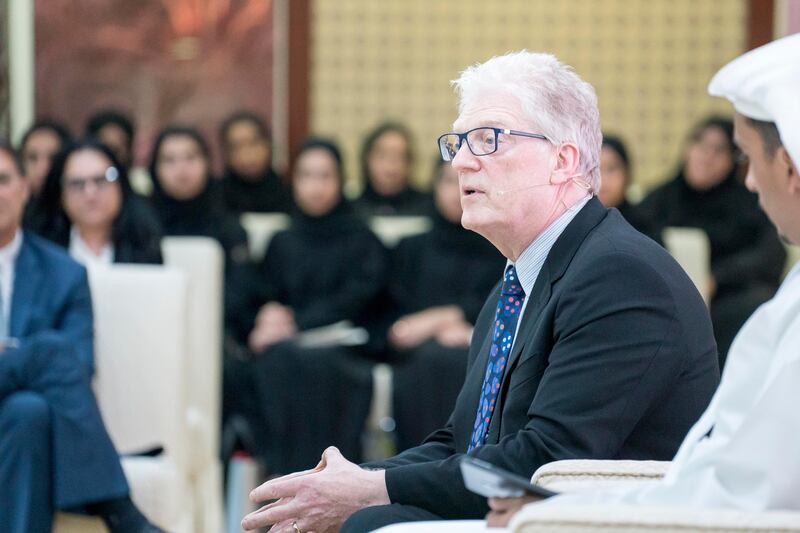Too many parents and schools are stripping pupils of their creativity, according to a renowned expert on education.
“We have to personalise education… then young people will be equipped to earn a living in a world that is shaping around them,” said Sir Ken Robinson, a British author and academic whose TED Talk on schools 'killing creativity' has been viewed almost 50 million times online.
Sir Ken was speaking at a special lecture at the Crown Prince Court in Abu Dhabi on Wednesday night.
He said that curriculums across the globe need to have flexibility and be broad enough to make room for creativity.
“You don’t get that from a purely science curriculum. Education has social purposes but above all let them have their strengths to be able to live life," said Sir Ken, who was involved in the modernisation of the education system in England and Wales in the 1980s and 1990s.
The answer is to invest more in teachers, and focus less on testing, which he suggested limits a student's ability to think creatively.
“The US made the mistake of thinking you can improve education by more testing and typed words, but if you do that you will not have engaged teachers and you will not improve," he said.
Fault does not solely lie with schools and countries' education authorities.
He said many pushy parents are driving themselves "up the wall" to make their children achieve good grades.
He showed the audience an image from the India state of Bihar that made headlines across the world in 2015.
It shows parents standing outside school windows and even scaling the upper floors to hold up exam answers on sheets to their sons and daughters inside.
The image placed the spotlight on the pressure some children are under, and lengths parents will go to, to pass exams.
“This is corruption of what education should be, but I show it to you because parents around the world are doing the same thing, driving themselves up the wall to make their children pass and earn high grades to get into the best universities and consequentially find a good source of income.
“We should put them in good universities and everything… but the human brain and capability is much more diverse than that, and communities do not only depend on academic work."
As evidence of that closer to home, an Abu Dhabi Education Council study of 20,000 parents in 2013 found half employed private tutors for their children.
_____________
Read more
[ Rise of private tutors as UAE parents push children to achieve ]
[ Half of Abu Dhabi parents hire private tutors, survey finds ]
_____________
He pointed to the Sheikh Zayed Grand Mosque as an example of a beautiful city monument “that was not constructed by essay writers on how to do a great mosque, but by people who saw a vision.”
“Cities are built on that, but schools aren’t, they are very focused on academic work," he said.
It is also important to distinguish between education and learning, he said. While children may not enjoy education at all, they naturally love to learn.
This is evident from the amount of powers they learn to adopt in their early years, such as learning to speak. No body teaches them how to speak, they just take it into their own skin, he said.
Once schools are transformed and result in more creativity and innovation, he said, we will find new ways to deal with issues that have risen from the industrial revolution and evolving technologies. And for the equation to be complete, schools must communicate more with parents and involve them in the education process, he concluded.







